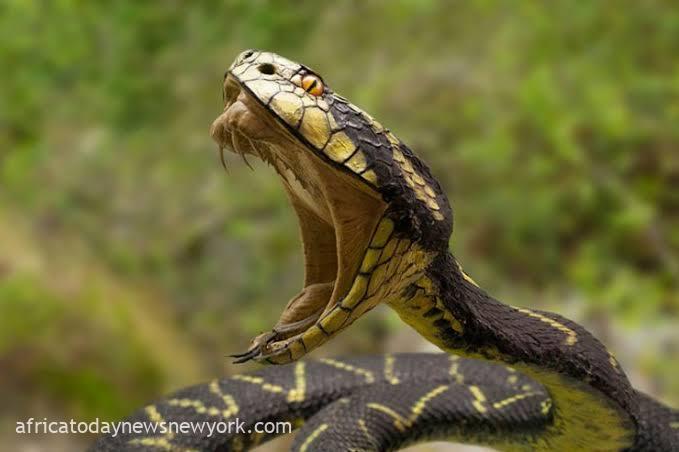Survivors recently freed from the clutches of their captors have spoken out, revealing the disturbing tactic employed by kidnappers: the use of poisonous snakes to intimidate and terrorize them.
Speaking separately to the News Agency of Nigeria, certain individuals detailed their encounters with a plethora of snakes in the forests where bandits are known to roam.
The victims recounted instances where the snakes would indiscriminately attack both captors and captives. One individual, preferring anonymity, confided to NAN that kidnappers would maliciously toss them into areas known to be rife with snakes.
He said, ‘The kidnappers know the areas infested with snakes and would often throw the victims there.’
‘Immediately they see snakes, the fear-stricken victims will want to run away. The sight is used to frighten people.’
‘That is the time a victim can ask friends and family members to sell everything – house, land, cars, household items, shoes, just everything – to raise the ransom.’
The investigation has uncovered that the forests with the highest concentration of snakes are located in Birnin Gwari, Kaduna State, and Kala-Balge, near Lake Chad, in Borno.
Additional areas identified include Shaki in Oyo State, Borgu and Kagara in Niger State, Karim Lamido in Adamawa State, and Lau in Taraba State.
According to some of the victims, the current heat exacerbates the situation, as snakes emerge from their hiding spots in search of both fresh air and food.
Read also: Flying Snakes And How They Can Glide Through The Air
‘The nights are often more traumatising. You are left outside in the dark, and a reptile may just creep through your legs.’
‘While I was in captivity, snakes bit some victims. The kidnappers were not spared as some of them also got bitten,’ a victim, who was taken to a thick forest in Kagara, in Niger, told NAN.
According to him, in Kagara forest, the snakes are so common that the locals refer to them as “kadangarun Kagara (Kagara lizards).”
Speaking about the development, Prof. Abdulsalam Nasidi, Chairman of the Echitap Study Group overseeing Echitap Anti-Snake Venom, validated the association between banditry and regions prone to snake bites.
Nasidi, who collaborates with Micropharm UK Limited and Instituto Clodomiro Picardo, Costa Rica, to facilitate the importation of drugs into Nigeria, expressed concern about the growing cases of snake bites in the country.
He said, ‘Unfortunately for us, the cost of snake bite treatment has gone well beyond the reach of the poor,’ he said.
While confirming that some abductees returned with snakebite wounds, he said that the cost of treatment could only be affordable if the ASV drugs were produced locally.
‘The ASV manufacturers are ready to collaborate with us to produce the ASV in Nigeria.’
He stated that producing ASV locally in Nigeria would enable it to be available at a reduced cost. He further mentioned that the increase in the value of the dollar had resulted in foreign production costs becoming prohibitively high, making it unaffordable for the average person, who is often the victim of snake bites.

